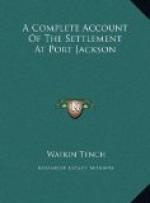Saturday April 16th, 1791. It was this morning resolved to abandon our pursuit and to return home; at hearing of which our natives expressed great joy. We started early; and reached Rose Hill about three o’clock, just as a boat was about to be sent down to Sydney. Colbee and Boladeree would not wait for us until the following morning, but insisted on going down immediately to communicate to Baneelon and the rest of their countrymen the novelties they had seen.
The country we passed through was, for the most part, very indifferent, according to our universal opinion. It is in general badly watered. For eight miles and a half on one line we did not find a drop of water.
RICHMOND HILL
Having eluded our last search, Mr. Dawes and myself, accompanied by a sergeant of marines and a private soldier, determined on another attempt, to ascertain whether it lay on the Hawkesbury or Nepean. We set out on this expedition on the 24th of May, 1791; and having reached the opposite side of the mouth of the creek which had in our last journey prevented our progress, we proceeded from there up to Richmond Hill by the river side; mounted it; slept at its foot; and on the following day penetrated some miles westward or inland of it until we were stopped by a mountainous country, which our scarcity of provisions, joined to the terror of a river at our back, whose sudden rising is almost beyond computation, hindered us from exploring. To the elevation which bounded our research we gave the name of Knight Hill, in honour of the trusty sergeant who had been the faithful indefatigable companion of all our travels.
This excursion completely settled the long contested point about the Hawkesbury and Nepean. We found them to be one river. Without knowing it, Mr. Dawes and myself had passed Richmond Hill almost a year before (in August 1790), and from there walked on the bank of the river to the spot where my discovery of the Nepean happened, in June 1789. Our ignorance arose from having never before seen the hill, and from the erroneous position assigned to it by those who had been in the boats up the river.
Except the behaviour of some natives whom we met on the river, which it would be ingratitude to pass in silence, nothing particularly worthy of notice occurred on this expedition.
When we had reached within two miles of Richmond Hill, we heard a native call. We directly answered him and conversed across the river for some time. At length he launched his canoe and crossed to us without distrust or hesitation. We had never seen him before; but he appeared to know our friend Gombeeree, of whom he often spoke. He said his name was Deedora. He presented us with two spears and a throwing-stick, and in return we gave him some bread and beef. Finding that our route lay up the river, he offered to accompany us and, getting into his canoe, paddled




